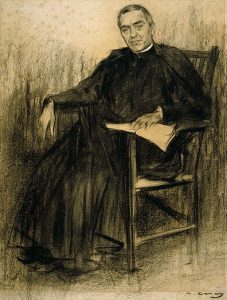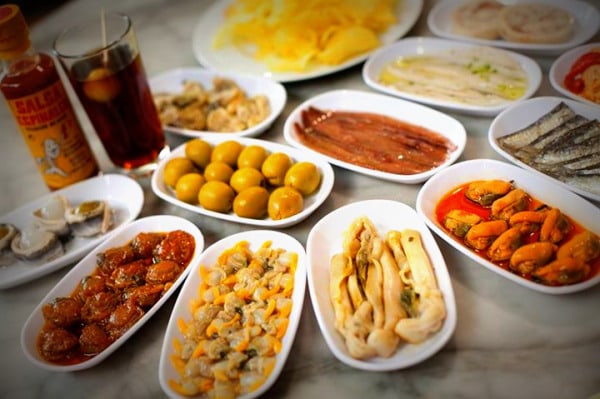Verdaguer
Maybe the first thing that springs to mind is that metro station in Barcelona whose name you can’t pronounce. The Verdaguer monument is close by, unreachable in the centre of a major road intersection. In fact Catalonia is jammed with streets and squares, schools and other institutions (and monuments) commemorating Jacint Verdaguer.
So who was this obviously iconic Catalan?
First, though, the pronunciation: VairduhGEH. Also known affectionately as mossèn Cinto – Father Cinto – moossen SINtu (yep, he was a priest.)
Jacint Verdaguer i Santaló (1845 – 1902) is regarded as one of the greatest poets of Catalan literature and a leading literary figure of the Renaixença, a cultural revival movement of the late Romantic era. He was a prolific writer who gave the Catalan language the push it needed to rise from the ashes.
According to a word cloud now gracing a wall inside the Vil.la Joana, the summer house in the hills outside Barcelona where Verdaguer died of tuberculosis (recently reopened as the Casa Verdaguer de la Literatura), ‘amor’ (love) is the word Verdaguer used most often, followed by ‘Maria’, ‘flor, ‘Jesús’ and ‘Sant’. His writing spanned epic and lyrical poetry, narrative prose and travel writing (at one stage he worked as a priest on transatlantic liners), had an enormous popular influence unrivalled in his time, and some of it has been translated into lots of languages. His most famous works were the epic poems, the award-winning ‘l’Atlàntida’ (fragments of which were later set to music by Falla) and ‘Canigó.’
His death was mourned by all Catalonia and his funeral was one of the country’s largest ever public outpourings of grief.
And yes, I’d love to dig deeper into what made him tick.

Vermut
The first (and last) time I went to a Sunday brunch here, I had what felt like gastric jet lag. I mean, why would you do brunch when you can have a late breakfast of delicious pastries and coffee, and then, before your late, long, lazy lunch, the vermut?
Yes, vermouth, of course. But in Catalonia ‘fer el vermut’ means much more than just knocking back a glass of the stuff. It’s a beloved tradition, an eminently social occasion, especially on Sundays (originally after mass): it’s a pre-lunch drink and salty snack with friends and family, on a bar terrace, in a restaurant, or at home.
Traditionally, adults drink vermouth and kids non-alcoholic drinks. Olives are a must – and you may get anchovies, crisps, salted almonds, clams and so on. So get yourself to a tourist-free town or neighbourhood on a sunny Sunday (late) morning and – salut!

